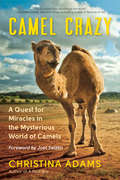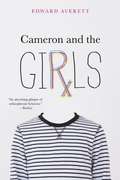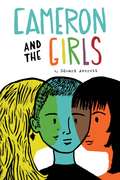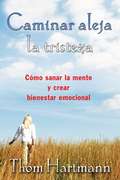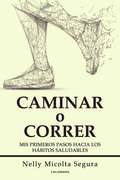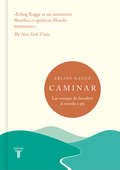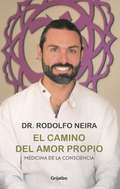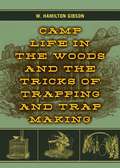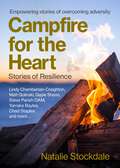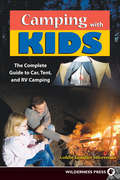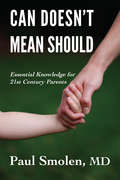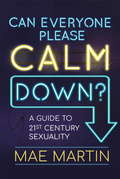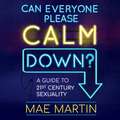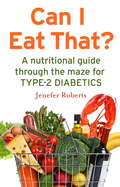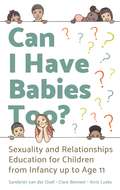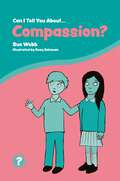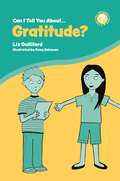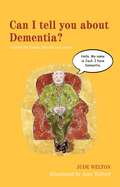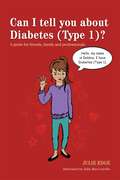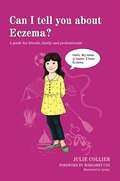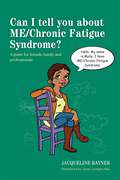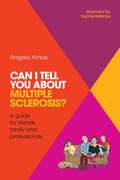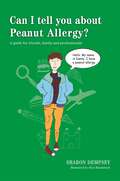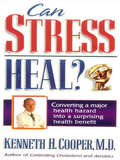- Table View
- List View
Camel Crazy: A Quest for Miracles in the Mysterious World of Camels
by Christina AdamsIn this page-turning odyssey, a mother on a mission travels the globe — from Bedouin camps in the Middle East to Amish farms in Pennsylvania to camel-herder villages in India — to obtain camel milk, which dramatically helps her son’s autism symptoms. Chronicling bureaucratic roadblocks, adventure-filled detours, and Christina Adams’s love-fueled determination, Camel Crazy explores why camels are cherished as family members and hailed as healers. Adams’s work uncovers studies of camel milk for possible treatment of autism, allergies, diabetes, and immune dysfunction, as well as ancient traditions of healing. But the most fascinating aspect of Adams’s discoveries is the gentle-eyed, mischievous camels themselves. Huge and often unpredictable, they are amazingly intelligent and adaptable. This moving and rollicking ode to “camel people” and the creatures they adore reveals the ways camels touch lives around the world. Includes users’ and buyers’ guides to camel’s milk
Cameron And The Girls
by Edward Averett"Mad crashes into happy and sad bounces off of guilty until they all live in a big smoky heap in my mind." Fourteen-year-old Cameron Galloway of Lexington, Washington, understands that he has schizophreniform disorder and needs to take pills to quiet the voices in his head. But he likes the voices, especially the gentle, encouraging voice of The Girl. Conflicted, he turns to his friend Nina Savage, who is clinically depressed and can relate to his horror of the numbing effects of medication. They make a pact to ditch the pills. At first they feel triumphant, but soon Cameron's untreated mind goes haywire--to disastrous effect.and a young man at the center of it all, desperately trying to find his way into adulthood.
Cameron and the Girls
by Edward Averett<P>"Mad crashes into happy and sad bounces off of guilty until they all live in a big smoky heap in my mind." <P>Fourteen-year-old Cameron Galloway of Lexington, Washington, understands that he has schizophreniform disorder and needs to take pills to quiet the voices in his head. But he likes the voices, especially the gentle, encouraging voice of The Girl. <P>Conflicted, he turns to his friend Nina Savage, who is clinically depressed and can relate to his horror of the numbing effects of medication. They make a pact to ditch the pills. At first they feel triumphant, but soon Cameron's untreated mind goes haywire--to disastrous effect and a young man at the center of it all, desperately trying to find his way into adulthood.
Caminar aleja la tristeza: Cómo sanar la mente y crear bienestar emocional
by Thom HartmannUn nuevo enfoque sobre cómo usar las caminatas para curar traumas emocionales y propiciar un funcionamiento mental óptimo• Examina por qué y cómo llevamos con nosotros heridas emocionales y la forma en que pueden curarse y solucionarse• Muestra cómo caminando se estimulan ambas partes del cerebro, lo que potencia y restablece la salud mental• Ofrece ejercicios mentales simples, pero eficaces, que pueden practicarse mientras caminamosPor lo general, nuestros cuerpos se curan rápidamente de las enfermedades, las lesiones o las heridas. Pero nuestras mentes y nuestros corazones sufren durante años con los síntomas debilitantes de la angustia y la tristeza. ¿Por qué resulta tan difícil sanar el trauma emocional? Thom Hartmann ha descubierto que, a sólo unos pasos, hay una terapia bilateral simple y efectiva para esa sanación.
Caminar o correr: Mis primeros pasos hacia los hábitos saludables
by Nelly Micolta SeguraCon Caminar o correr beneficias tu salud a nivel físico y mental. A pesar de la diversidad tecnológica que gozamos en la sociedad actual, aún nos encontramos con una problemática a escala mundial: la salud. Aunque en los últimos años se ha estado más informado que antes, Caminar o correr -por su contenido preventivo y técnico- es la guía del principiante para un estilo de vida saludable. Cada persona puede poner en práctica lo que busca y necesita entre los principios básicos de la vida sana, como la respiración consciente, la motivación para ejercitar el cuerpo, la alimentación saludable, el uso de autoterapias y ejercicios reconstituyentes en beneficio de cuerpo y mente.
Caminar: Las ventajas de descubrir el mundo a pie
by Erling KaggeTras el éxito internacional El silencio en la era del ruido, Erling Kagge nos deleita con un libro sobre el placer de caminar. Libros que respiran y te hacen respirar. «Casi todos los problemas parecen distintos después de un paseo.» Al caminar, con o sin rumbo, nuestro cuerpo viaja a la velocidad de nuestra mente. Solo cuando damos un paso tras otro podemos descubrir la tierra que pisamos, y a nosotros mismos. La capacidad de andar erguidos nos convirtió en lo que somos, y al dejar de caminar abandonamos también nuestra esencia, nos convertimos en otra cosa. Este libro, una agradable caminata en excelente compañía, nos recuerda la alegría de las caminatas, breves o largas, y nos convence de que quien va a pie llega más lejos y vive mejor. En el camino, nuestros pasos se cruzan con figuras como Machado, Heidegger, Thoreau, Neruda o Steve Jobs. Erling Kagge, el autor que nos enseñó a encontrar el silencio en este estruendoso mundo, vuelve con un evocador libro sobre el placer y el equilibrio que se pueden encontrar en tan simple actividad. La crítica ha dicho...«Erling Kagge es un aventurero filosófico, o quizás un filósofo aventurero.»The New York Times «¿Quién mejor que un avezado explorador para hablarnos del silencio? El silencio está en todos lados. Basta con reconocerlo y saborearlo. Toda una filosofía de vida. Y también una nueva forma de lujo que ya tiene numerosos adeptos.»Le Figaro Magazine (sobre El silencio) «Una valiosa guía en la que Kagge da cuenta de los inestimables beneficios de encontrar la quietud. Para él, desconectar no significa alejarse del mundo. Al contrario: se trata de disfrutar más intensamente de la vida y de la compañía.»L'Express (sobre El silencio)
Camino del amor propio: Medicina de la consciencia
by Rodolfo NeiraLas claves para despertar y trabajar un nuevo estado de consciencia basado en el autocuidado y la empatía Rodolfo Neira, médico intensivista y panelista de televisión, advierte los riesgos físicos y mentales de nuestros hábitos cotidianos y aceptados convencionalmente: la sobrecarga laboral, el individualismo, el exitismo, el estrés crónico y, sobre todo, la mala alimentación y la acumulación de disconformidades o frustraciones. Neira explica, entre otros temas, cómo nuestros hábitos alimenticios han gatillado o acentuado patologías. Y, desde un análisis científico, pero también espiritual y filosófico, propaga el autocuidado y la noción de amor a sí mismo para trabajar la felicidad y la ecuanimidad: en otras palabras, ayuda a detectar las costumbres -conscientes o inconscientes- que dañan nuestra salud física y mental para así establecer un cambio progresivo y definitivo.
Camp Life in the Woods and the Tricks of Trapping and Trap Making: Containing Comprehensive Hunts On Camp Shelter, Log Huts, Bark Shanties, Woodland Beds, And Bedding, Boat, And Canoe Building, And Valuable Suggestions On Trappers' Food, Etc. (Lyons Press Ser.)
by W. Hamilton GibsonWhether or not a hunting expedition is in the plans this year, W. Hamilton Gibson’s guide to camping and trapping will give you a lesson in self-sufficiency and living simply. Building camp shelters and log huts, woodland bedding, and birch canoes are just some of the skills you can learn by reading this classic wilderness manual. Charming sketches throughout the book lend to the nostalgia of this timeless guide and depict many of the traps used when Camp Life in the Woods and the Tricks of Trapping and Trap Making was first published in 1882. This book is a perfect gift for the outdoorsman interested in learning new camping techniques, and the historian who will delight in the author’s details about life as a trapper in the late nineteenth century.Learn some of the old tried and true tricks for bait and trapping, such as creating portable snares or coop traps. These simple techniques make catching animals such as beavers, partridge, raccoons, and rabbits on your next camping trip a cinch. While the book includes numerous effective traps, it promotes a conservationist hunting style by encouraging readers to respect animals and to never pursue trap-making out of cruelty. The guide also includes information on how to make the most out of your catch, with recipes for making venison jerky, gutting fish, and instructions on curing and tanning fur skins.
Campfire for the Heart: Stories of Resilience
by Natalie StockdaleDo you ever wonder…. how other people cope with trauma, grief and tragedy? how other people rise from their lows? how other people find peace after pain? Campfire for the Heart answers these questions through powerful and compelling, true stories of human resilience. By learning how other people have converted their darkest times to personal growth and success, you may discover how you too can learn and grow from your hardships, how you can be the hero of your journey, or help others in theirs. The stories cover a vast range of life experiences from the death of children, violence, Taliban terror and wrongful imprisonment, to droughts, bushfires, cyclones, diseases, injuries, disabilities and trauma from military, police and humanitarian work. The storytellers are mostly unknown heroes of their personal journeys, while others are well-known champions of resilience – Lindy Chamberlain-Creighton, celebrity chef Matt Golinski, Steve Parish OAM and Gayle Shann – while cave-diving legend and Co-Australian of the Year 2019, Dr Craig Challen, opens the book with a foreword.The &‘campfire&’ stories are beyond inspiring. They stretch your perception of resilience, restore your love of humanity and illuminate pathways to happiness for us all.
Camping With Kids
by Goldie SilvermanLearn the basics of family camping from longtime outdoorswoman Goldie Silverman and the legion of experienced kid and parent campers that lent their voices to this authoritative, yet fun and whimsical book. Novice and experienced campers alike will find the tips in Camping with Kids invaluable. Whether car, tent, or RV-camping, you will find everything you need to know from preparing your family for a camping trip, to setting up camp, to what to do if things should go awry. It also tells you how to step beyond car camping into backpacking, canoe touring, and other extended adventures.
Can Alzheimer's Disease be Prevented?
by National Institutes on HealthLearning about risk factors you can't control, prevention strategies, what else can you do about Alzheimer's disease?
Can Doesn’t Mean Should: Essential Knowledge for 21st Century Parents
by Wedny Smolen Paul Smolen Benjamin SmolenDr. Smolen, a seasoned pediatrician and pediatric blogger, provides parents current, research based information to help them make informed decisions about family life. He provides practical tips and strategies for parents in the 21st century: Food - optimal nutrition and consequences of poor choices. Screen - the influence of quantity and type of screen time. Chores - responsibility shapes character. Money - value and management. Balance - academics, extra curricular activities, and unstructured play. Knowledge is power. Become a better parent and make it easier!
Can Everyone Please Calm Down?: A Guide to 21st Century Sexuality
by Mae MartinWhy do we find sexuality so, well ... scary? Comedian and co-creator of the hit show Feel Good, Mae Martin, investigates in this hilarious and intelligent guide to 21st century sexuality. By narrating her own, often humiliating, adventures in sex, dating and identity, Mae demystifies everything from weird crushes and coming out, to the pros and cons of labels and the joys of sexual fluidity.Mae's mission is to ensure that in a world that's full of things to worry about, who we choose to kiss should not be one of them. And when it comes to sexuality, she asks:CAN EVERYONE PLEASE CALM DOWN?
Can Everyone Please Calm Down?: A Guide to 21st Century Sexuality
by Mae MartinWHY DO WE FIND SEXUALITY SO, WELL ... SCARY?Comedian Mae Martin investigates in this hilarious and intelligent guide to 21st century sexuality. Covering everything from the pros and cons of labels, to coming out and the joys of sexual fluidity, Mae ponders all the stuff we get hung up about - and then a bit more.Mae's mission is to ensure that in a world that's full of things to worry about, who we choose to kiss should not be one of them. And when it comes to sexuality, she asks: CAN EVERYONE PLEASE CALM DOWN?
Can I Eat That?: A nutritional guide through the dietary maze for type 2 diabetics
by Jenefer RobertsWritten in a chatty and non-medical style, Can I Eat That? guides people through the initial and sometimes frightening stages which follow diagnosis of Type 2 diabetes. It contains an explanation of the nutritional factors behind the disease, and the nutritional factors in foods that are tolerated; and brings these factors together in advice on the choice - and the cooking - of beneficial and tasty foods. The book also contains over 100 various recipes for healthy, nutritious and above all enjoyable meals suitable for people with Type 2 diabetes.
Can I Have Babies Too?: Sexuality and Relationships Education for Children from Infancy up to Age 11
by Clare Bennett Sanderijn van der Doef Arris LueksDrawing on extensive professional and personal experience, this book offers guidance and advice on how to better communicate with children about relationships and sexuality using everyday situations. An invaluable resource for teachers and parents, it provides you with the tools you need to feel confident and informed about how to talk about sexual education at all stages. The book explores the challenges in adult-child communication about sexuality and provides helpful advice on how to establish an open dialogue. The guidance provided is developmentally appropriate, with chapters moving through different ages and development stages. Throughout, the book emphasizes the importance of positive sexuality education, empowering children to enjoy their relationships and sexuality in a safe and healthy way.
Can I Tell You About Compassion?: A Helpful Introduction for Everyone (Can I tell you about...?)
by Rosy Salaman Sue WebbMeet Sam. Like most kids his age, Sam loves sport. His class have arranged a special football match to raise money for a charity which helps children who are suffering. Sam finds out more about how the money is spent and asks his mum for this week's pocket money early, so he can donate to the charity. His mum says he does this because he's such a kind boy. But when he asks his teachers about it at school the next day, they say it's because he's compassionate. Sam now has lots of questions about what this means. What is compassion? How can we become more compassionate? And what effects - both good and bad - does being compassionate have? Join Sam as he learns answers to these, and many more, questions about this important part of character education.
Can I Tell You About Gratitude?: A Helpful Introduction For Everyone (Can I Tell You About...' Ser.)
by Rosy Salaman Liz GullifordMeet Maya. Maya always tries to be polite, and to remember to say 'thank you' but she wants to learn what it means to be truly grateful. Should she be grateful to her teachers for their hard work, even though they're only doing their job? Does she need to say thank you for the gifts she doesn't really like - like the pink scarf Nani gave her last birthday? And when Laura gives her some earrings but later asks to copy her history project in return, should Maya be grateful and give her the thank you letter she has written? This illustrated book is an ideal conversation starter for children aged 7+, helping them to understand what gratitude means, recognise when it is appropriate, and develop their own ability to be genuinely grateful.
Can I tell you about Dementia?: A guide for family, friends and carers
by Jude Welton Jane TelfordMeet Jack - an older man with dementia. Jack invites readers to learn about dementia from his perspective, helping them to understand the challenges faced by someone with dementia and the changes it causes to memory, communication and behaviour. He also gives advice on how to help someone with dementia stay as mentally and physically active as possible, keep safe and continue to feel cared for and valued. With illustrations throughout, this useful book will be an ideal introduction to dementia for anyone from child to adult. It will also guide family, friends and carers in understanding and explaining the condition and could serve as an excellent starting point for family discussions.
Can I tell you about Diabetes (Type 1)?: A guide for friends, family and professionals
by Julia Macconville Julie EdgeMeet Debbie - a young girl with diabetes type 1. Debbie invites readers to learn about this type of diabetes from her perspective, describing how it feels to have high and low blood sugar levels. She explains how she can monitor her blood sugar and controls it with medication. Debbie also talks about the challenges of having diabetes and lets readers know how she can be helped and supported. This illustrated book is ideal for young people aged 7 upwards, as well as parents, friends, teachers and nurses. It is also an excellent starting point for family and classroom discussions.
Can I tell you about Eczema?: A guide for friends, family and professionals
by Apsley Julie Collier Margaret CoxMeet Helen - a girl with eczema. Helen invites readers to learn about this skin condition from her perspective, describing how it feels to have itchy and inflamed skin nearly all the time. She explains how different creams, ointments and other treatments can help her skin to feel better and lets readers know about other ways she can be helped and supported. This illustrated book is ideal for young people aged 7 upwards, as well as parents, friends, teachers and nurses. It is also an excellent starting point for family and classroom discussions.
Can I tell you about ME/Chronic Fatigue Syndrome?: A guide for friends, family and professionals
by Jacqueline Rayner Jason Lythgoe-HayMeet Mollie - a woman with an illness called ME (Myalgic Encephalomyelitis) or CFS (Chronic Fatigue Syndrome), and her family, Mike, Ellie and Eric. Mollie and her family help readers to understand what ME/CFS is, what it is like to have it and how it can affect their family life. Mollie can't always do things that other mums do because of her illness, which can sometimes be frustrating, but they share strategies that help them all to cope. The family also explain how ME/CFS can affect different people in different ways. This illustrated book is an ideal introduction to this often misunderstood condition. It shows family, friends and anyone who knows someone with the condition how they can support someone with ME/CFS, and their family.
Can I tell you about Multiple Sclerosis?: A guide for friends, family and professionals
by Angela Amos Sophie WiltshireMeet Maria - a woman with Multiple Sclerosis (MS). Maria tells the story of her holiday with her husband Ben, her children Cara and Dino, and Teddy the dog, which was interrupted when she began to feel dizzy, exhausted and weak. She explains how this led to her diagnosis and describes what MS is, how it affects her daily life and what others can do to help. This illustrated book will be an ideal introduction to MS for children from the age of 7, as well as older readers. It will help family, friends and carers to better understand and explain MS, and will be an excellent starting point for group discussions.
Can I tell you about Peanut Allergy?: A guide for friends, family and professionals
by Alice Blackstock Sharon DempseyMeet Danny - a boy with a peanut allergy. He explains that peanut allergies can be very serious, but once you know how to manage them, they don't have to get in the way of living a fun and full life. Danny talks about what a peanut allergy is, what do to in an emergency, and how his friends and family can help him to live a nut free life. He also shares advice on coping with a peanut allergy on special occasions and trips away. This illustrated book is ideally suited for readers aged 7 and upwards, and will be an excellent way to increase awareness about peanut allergies, in the classroom or at home. It also includes clear, useful information for parents and professionals.
Can Stress Heal?
by Kenneth CooperStress is an inevitable part of daily life. Yet, there is a way to develop a resilience to stress and turn that stress to benefit. In Can Stress Heal?, Dr. Kenneth H. Cooper, an international leader in preventative medicine, has developed a groundbreaking new approach that allows you to use stress to your advantage.
